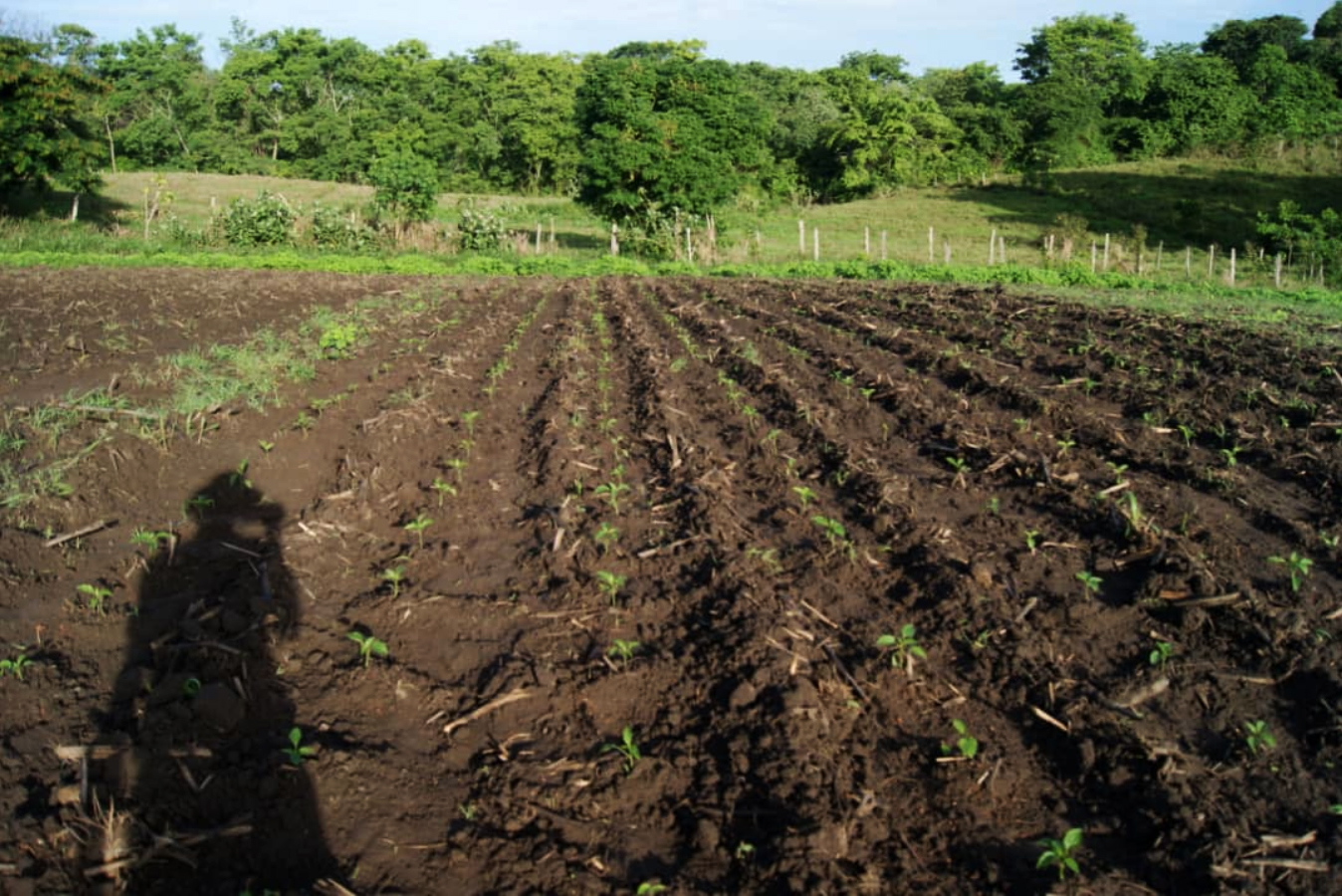

 In San Simón, an expanse of open ground located in the state of Bolívar, in southern Venezuela, Gregoria Zapata and Jesús Manuel Umbría grow peppers, beans, and corn. They also had three horses and one mare that they used to work the land and for transportation. But one day, when they woke up in the early morning hours, the animals were missing.
In San Simón, an expanse of open ground located in the state of Bolívar, in southern Venezuela, Gregoria Zapata and Jesús Manuel Umbría grow peppers, beans, and corn. They also had three horses and one mare that they used to work the land and for transportation. But one day, when they woke up in the early morning hours, the animals were missing.

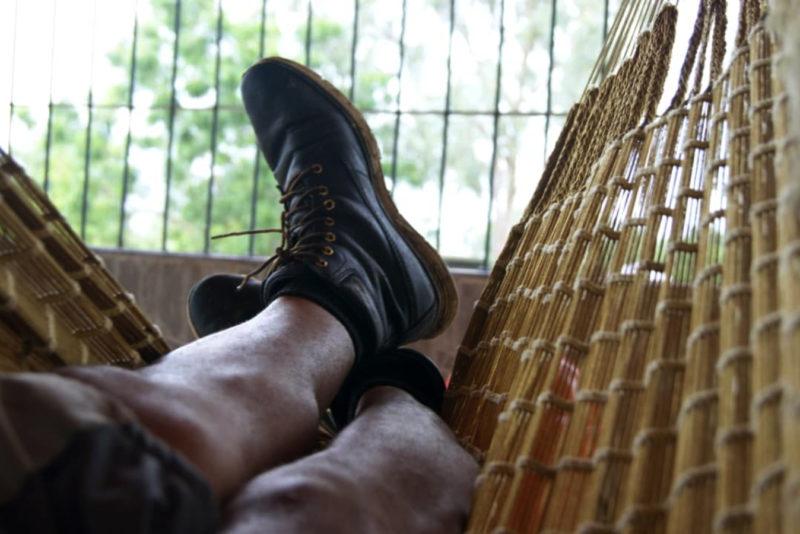
“I had been telling Jesús Manuel, every day for three days, that I didn’t agree with him leaving the horses there where he did,” says Gregoria Zapata, recalling the afternoon of March 14, 2019, when one of the horses would not budge when they were about to take the four of them to the entrance of the small farm. Jesús Manuel, her husband, tried by pulling on the horse’s rope, but the animal refused to move forward.
Gregoria is sitting by her doorway. Her eyes heavy with sadness, she gazes at the area of pastureland that faces the dirt road. It is 15 hectares in San Jacinto, a peasant settlement about 31 miles from Puerto Ordaz, sitting along the border of the road that leads to Ciudad Bolivar, state of Bolivar, in southern Venezuela. Gregoria and Jesús Manuel Umbría grow vegetables and medicinal plants, and have an outdoor corral, a henhouse, and a pond to grow fish.
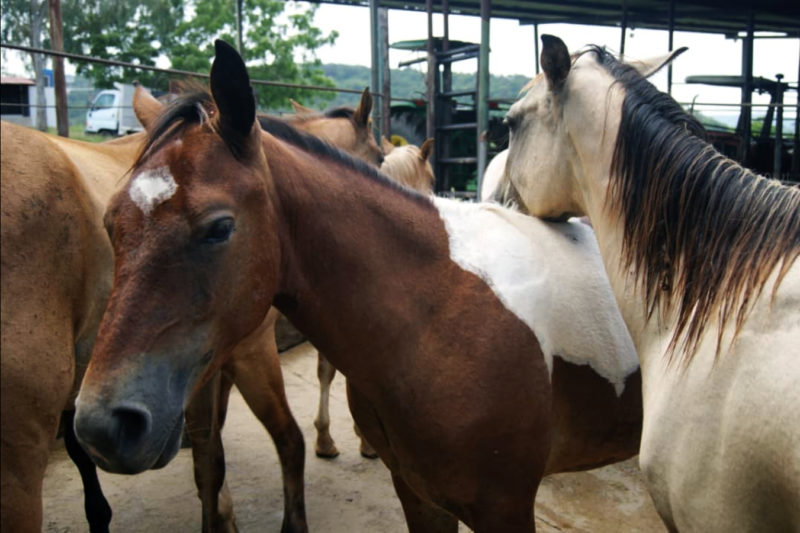
The afternoon in question, Gregoria stroked the head of the reluctant horse and talked to him.
“What is it, Llanerito? Don’t you worry. You won’t be left alone. They are going to take you to your own right away.”
Chepi, as the villagers affectionately call Gregoria, thought the horse was crying because he thought they were leaving him behind. And she says so firmly convinced that animals, especially horses, can sense the good and bad things that are about to happen. The afternoon when Jesús Manuel took Llanerito to the farm’s pastureland, along with Hierro, Chiquito, and the mare Shambhala, the horse turned his head and looked at her.
“Honest to God, I am almost certain that he knew what was going to happen,” she insists.
Llanerito, Hierro, and Chiquito arrived at the farm in 2014. Shambhala joined them two years later, when she was just a few months old.
The horses belonged to a neighbor who had had a power transformer and a water pump stolen; he sold them to Jesús Manuel and left the field for good. The mare, on the other hand, belonged to an elderly woman whose husband had died and whose children had migrated, so she was all by herself and had no way to take care of the animal, and Chepi bought it from her.
On one occasion, when Shambhala was 9 months old, she ran madly into the house and threw herself on the floor. She stayed there for hours, and Chepi cried because she thought the mare was going to die on her. Jesús Manuel found her rope tossed in the pasture: someone had tried to take her away. Concerned because Shambhala would not get up, the woman summoned a local man who knows a great deal about animals.
“She is showing all the symptoms of a horse that has been given quieto,” he diagnosed. Quieto is the word they use to refer to a sedative, usually a barbiturate, which thieves inject into cattle to dope them so that they can be stolen more easily.
She drew blood from the mare and took the sample to a laboratory, where they confirmed that she had indeed been sedated.
It didn’t come as much of a surprise to Chepi and Jesús Manuel. They had already heard of a gang of horse thieves in the area that took them, killed them, and sold them as beef in the markets. The crooks were ripping off the beef traders and the latter, unknowingly, were cheating the consumers. So, when Chepi and Jesús Manuel noticed that the gang had tried to take Shambhala away from them, they decided to remain vigilant, going to bed later and getting up in the morning as soon as the dogs started to bark. And they took the precaution of moving the horses from one spot to another at night.
The horses were important to them. They used two to get around and two to work the 15 hectares of land they had at the time. They would call them by their names, and the animals would raise their heads and trot to where Chepi and Jesús Manuel were and they would lower their heads to be put on their harnesses and rigging, and off to work. They were docile.
Chepi and Jesús Manuel didn’t want to push the horses too hard, so they used them in turns when it came to working the land with a plough, for sowing. It took them three days: one, they would take Chiquito and Hierro; the next, they would take Llanerito and Chiquito; and then Llanerito and Hierro. Shambhala was only 2 years old, so they did not put any heavy work on her.

At that time, they planted chili peppers, beans, and corn; especially corn, because the couple lived off the chili peppers and the animals off the beans. Chepi would place corn kernels in a plastic bottle or a metal pan, and shake it. When the horses heard the sound, which resembled that of maracas, they stopped grazing and ran to her. The Umbría Zapatas also cultivate the friendship of their neighbors in San Jacinto. Gregoria, who at 53 years old is a biomedical engineer graduated from the Simon Bolivar University in Caracas, practices natural medicine. She sees patients in her own house, and sometimes she rides a horse, like an amazon, and goes to their homes.
During a visit she made to one of Jesús Manuel’s goddaughters, a neighbor shouted at her:
“Chepi, get off the horse. My little girl is sick!”
She dismounted from Llanerito and tied it up on a hillock from which you could not see the neighbor’s house, or the horse from the other side. The girl was very ill and it took Chepi a while to bring her fever down. Two hours later, when she came out, she did not find Llanerito where she had left it. Only the rope from which he had broken loose.
That morning, when Chepi left the house, Jesús Manuel was already out, working with Hierro. So Llanerito, instead of going straight back to the farm, which was not far away, went looking for Jesús Manuel’s goddaughter, whom he took to the mound where he thought he had lost his owner.
“It was as if he was telling her: ‘I lost her, I don’t know where she is.’ Now, he was closer to our house; so, why didn’t he go there instead of going looking for me at my goddaughter’s? Because he knew that Jesús Manuel was not there. And you can call me crazy, but anyone who owns a horse knows that this is true. That is why I say that those who steal a horse from his family have no idea of the harm they are causing; not a clue.”
The couple used the animals to work the land and to move around, but they were as fond of them as anyone is of their pets.
“If someone told us: ‘Let’s go to the beach for the weekend’, we would decline the invitation because we didn’t want to leave the horses unattended. Who was going to feed them, to take care of them?,” adds Gregoria.
And she insists on remembering the afternoon of March 14, 2019, when Llanerito looked at her with tears in his eyes, and she had the feeling that something bad was going to happen.
Jesús Manuel took the horses to the farm’s main entrance, near the dirt road. Chepi had been pleading with him for the past three days not to do it, because the neighbors had warned her that three boys, armed with machetes, knives and shotguns, were prowling the area. But it had not rained for a while, and that was the only place where there was enough pasture for the horses to eat. There used to be a time when they substituted the grass with corn or oats, but the yield had not been good, and now they had no choice but to leave them there.
The ropes of Llanerito, Chiquito, Hierro, and Shambhala were tied up to logs. The distance between the horses was about 20 or 30 meters. Jesús Manuel and Chepi could see them from the house during the day, but not at night.
That day, they went to bed at 11:00 p.m., and at 12:00 p.m. Shambhala, who was coming into heat, neighed.
“A neighbor owns a young horse who wanted a mare to mate. So, when he saw her grazing from afar, he whinnied and she heard him and answered him back. Maybe that’s why we didn’t pay much attention to it. Jesús told me that he thought Chiquito was bothering her precisely because she was coming into heat,” says Gregoria.
At 1:30 in the morning, the dogs barked. Chepi got up, took a flashlight and shone it towards the pastureland, but saw nothing.
“We didn’t have the powerful flashlights we have now. And we couldn’t see anything because ours didn’t give enough light.”
Jesús Manuel got up at 3:30 a.m., and, instead of checking on the chickens or the hens, he went straight to where he had left the horses and the mare, only to find their ropes cut on the grass.
Someone had taken them.
He returned home, showed his wife the ropes, grabbed the flashlight, the helmet, the machete, put on his high boots, and followed the trail. Chepi also put on her high boots and went check with the neighbors because, although it is not easy for four horses to get loose at the same time, they wanted to think that it was a possibility that they’d be there.
“I already felt deep in my heart that they had been stolen,” Gregoria recalls. “Then, I remembered Llanerito’s tears: how he leaned on my shoulder and how he resisted when Jesús pulled on him to tie him up on that side of the pastureland.”
Jesús Manuel attached the flashlight to his helmet and looked for footprints or traces on the ground. His 30 years of experience working the land had taught him that, no matter how stealthy an animal or person is, they always leave a trace.
And a trace he found after an hour’s walk, at dawn, 800 meters from his farm.
It was a boot print… filled with blood.
He continued along the road and found more and more shoe prints and boot prints, until he came across a 3-by-6 meter abandoned hut of a neighbor’s. Jesús went inside. There were four windows, and a rope on each one of them, the white walls splattered with blood.
“That’s where they slit their throats. From what I saw, I can only imagine how violently they were slaughtered, the rage, the kicking of the animals.”
There was only weed and straw on the ground. Jesús Manuel came out of the hut and found, about 2 meters from each window, the heads, the tails, the viscera, the ribs, and the legs of Hierro, Chiquito, Llanerito, and Shambhala, piled up like garbage bags. On top of the remains, the rustlers had left the hide.
It was 6:00 in the morning.
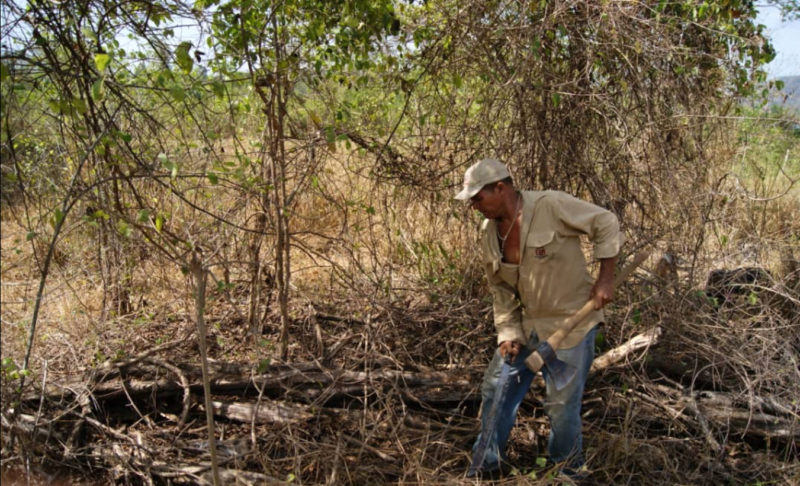
“That was the horse’s waste, that which they cannot sell for a profit. Who is going to buy that?” asks Jesús Manuel, heavy-hearted.
He returned home, told Chepi what had happened, and went to file a complaint at a post of the Bolivarian National Guard.
“They told me they had no men for that, as simple as that. ‘We are understaffed.’”
For months, Chepi would not leave her house.
The distance that Jesús Manuel used to cover on horseback in a matter of minutes, turned into hours and hours on foot.
People still come to the Umbría Zapata farm asking for Hierro, Chiquito, Llanerito, and Shambhala, and they cry when they hear what happened.
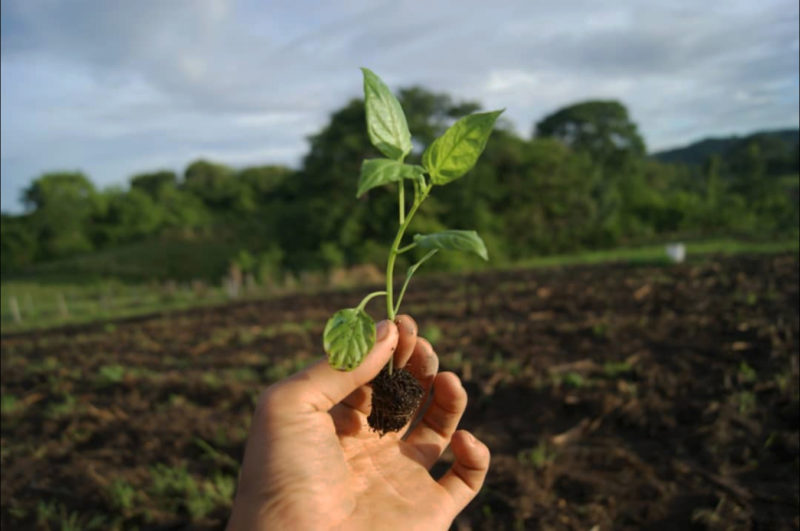
Some time later, Jesús Manuel bought a power tiller to plow the land. Chepi stopped making house calls, though she sees patients at the farm. In 2020, they only managed to plant 1 hectare because the power tiller uses gasoline, and there is no gasoline in San Jacinto. And they would have to pay 100 dollars for a tractor, which runs on diesel, to perform a single plowing work, or 300 dollars for the three they need for planting, and that is way too much money for them.
On March 11, 2020, something happened that fueled their sadness for the horses. Something that brought back the grief of having lost them. That day, Alex Pantin, the secretary of Citizen Security in the state of Bolivar, reported the arrest of three men who were stealing horses from the peasant settlement of San Jacinto to sell the meat in the markets of the area as beef. In the mug shot they released, one can see the backs of three men wearing shorts, t-shirts, and flip-flops, as well as the hides, legs, viscera and heads of six horses.
“What irks me is that they slaughtered them in such a brutal way just to sell them for three bucks. They didn’t kill them because they were starving. They did not! They did it for a profit, for money. It’s still a hard pill to swallow,” says Gregoria, her voice still faint.
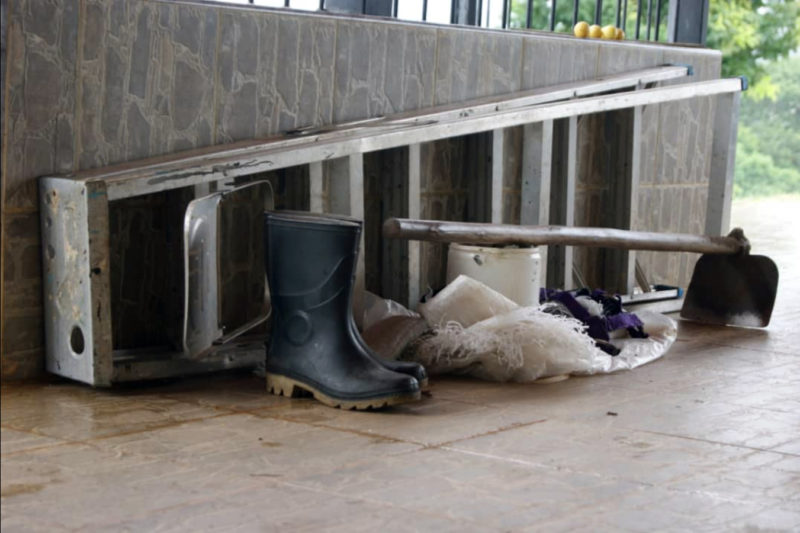
Sigue la Ruta del Hambre en: Escuchar el rugido de los camiones
 This story is part of La Ruta del Hambre [The Hunger Route], a publishing project developed by our network of storytellers in the 3rd year of the La Vida de Nos Itinerante training program.
This story is part of La Ruta del Hambre [The Hunger Route], a publishing project developed by our network of storytellers in the 3rd year of the La Vida de Nos Itinerante training program.
3176 readings
I watch movies, I write, and I teach at the Andrés Bello Catholic University, Guayana Campus. I also listen to hardstyle music. I am only consistently happy doing the latter.